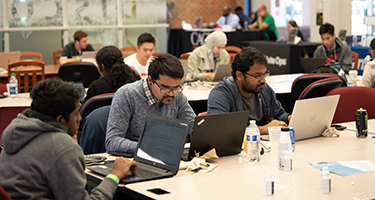
At Mason's PatriotHacks, about 300 students tackled problems in cybersecurity, machine learning, artificial intelligence, data science, sustainability, and automation.
It’s not often that college students have a chance to solve cybersecurity challenges, delve into data mining, and take a salsa dancing lesson over the same weekend.
But those who attended PatriotHacks, Mason’s second annual collegiate hackathon, did just that at the MIX@Fenwick, October 18 to 20.
About 300 students from Mason and several other universities tackled problems in machine learning, artificial intelligence, data science, sustainability, automation, and cybersecurity during the 36-hour event.
“I am impressed with all the innovative projects the students came up with,” says computer engineering senior and Honors College student Afnan Ali, co-organizer of PatriotHacks.
“The hackathon was about taking a challenge or problem, creating a solution, and hacking it together,” adds the event’s co-organizer Vijay Iyer, a senior majoring in neuroscience. “The hackers are the people who are putting projects together. It’s not about hacking into anything.”
The competition culminated with 45 projects for judges to evaluate.
Three Mason students who created a plan to improve the university’s Hydroponic Greenhouse won first place. Each member of the team received $350.
The students who did the greenhouse project “knocked it out of the park,” Iyer says. “They had solutions to every single thing that Mason’s Office of Sustainability asked for in the Hydroponic Greenhouse. They had blueprints for it. They made budgets for it. They knew what parts they needed, and they showed how it was completely implementable.”
“The hackathon gave students the opportunity to think outside the box, interact with industry experts, and work on real-world problems,” says faculty sponsor Kamaljeet Sanghera, associate professor and executive director for STEM Outreach for Mason Engineering.
CACI proposed a challenge on cybersecurity pen testing; GDIT on machine learning; the CoStar Group on data science.
Several other organizations offered challenges, including Informed XP, MetroStar Systems, White Ops, and Mason’s Office of Sustainability.
Besides doing projects, students participated in games, salsa dancing, and morning yoga.
